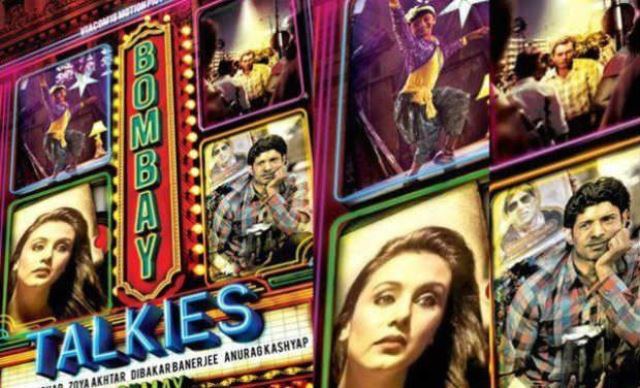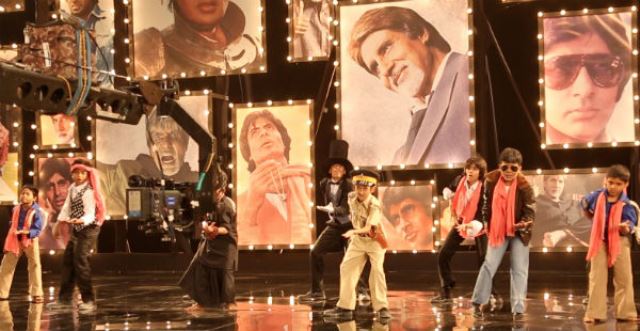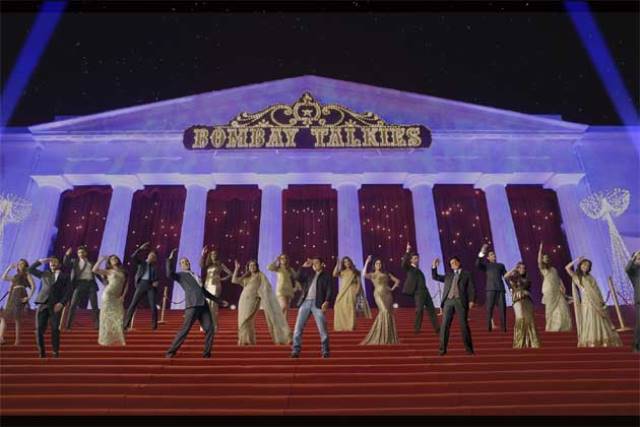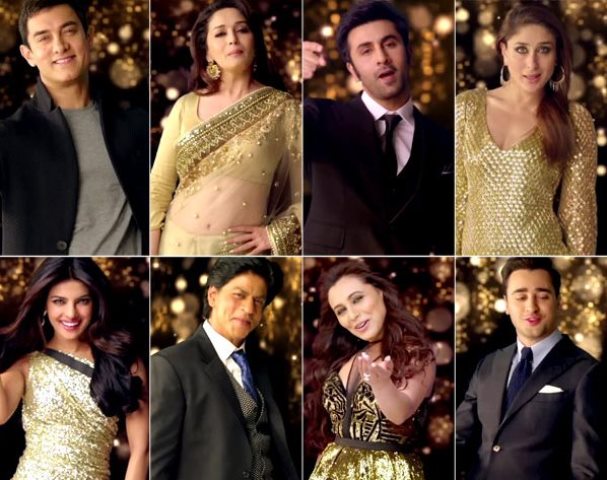This compilation of four stories delves into the magic and influence of cinema with subtlety and beauty
Karan Johar, Zoya Akhtar, Dibakar Banerjee and Anurag Kashyap – four directors with different sensibilities come together to commemorate 100 years of Indian cinema with Bombay Talkies. They weave four stories that revolve around the impact of Indian cinema on the lives of people. Each story has its own flavour and style, but the vision of each of the directors seems to match at some level, making them parts of the whole. Amit Trivedi’s music blends with the theme of each of the stories.
Karan Johar
Karan Johar, who represents the candy floss brand of Indian cinema, comes out of his comfort zone and directs the story of an urban married couple (played by Rani Mukerji and Randeep Hooda) dealing with a bad sex life. Enter an outgoing and openly homosexual young man (played by Saqib Saleem), and truth about their marriage begins to unfold. Lata Mangeshkar’s songs – Ajeeb dastaan hain yeh and lag ja gale play catalysts to the emotions boiling inside the characters. Using a child’s singing voice is a masterstroke as it brings forth the vulnerability of the trio. Niranjan Iyengar’s dialogues are interesting. “Tumhe kaise pata chalta hai ki kaun gay hai?” Rani asks. Saqib says, “Usko poocho ki wo Sridevi ka fan hai ya Madhuri Dixit ka. If he says Sridevi, then you know he’s gay. Bollywood mein har cheez ka solution hai!”
But Karan’s story is more about living a lie and coming to terms with your sexuality, cinema is just incidental (though he does make a deliberate reference to Bollywood reporting). Nonetheless he comes out really strong, sensitive and stoic as a director.
The opening shot where the camera lingers on the main door and then follows the character, the scenes between Saqib and Randeep on Mumbai’s railway bridge, and other cinematic techniques surprise you. Karan retains his drama but keeps the portrayal realistic. We hope that, encouraged by this stint, Karan steps out of his comfort zone more often. He did try to address themes of adultery and terrorism inKabhi Alvida Naa Kehna and My Name Is Khan respectively, but these films just couldn’t get out of the shadow of brand Karan Johar, and ended up as highly flawed attempts. There is surely a lot to the real Karan that we still haven’t seen on celluloid. This is definitely his best work.
The performances lift the narrative a notch higher. Rani Mukerji follows up her mature Talaashperformance with a power-packed act. She has learned to become less filmi and more naked – not literally – in front of the camera. Randeep Hooda shows great restraint playing the character of a man who is a closeted gay man. But it’s Saqib who steals the show with a surprisingly sparkling, spontaneous and mature portrayal of a homosexual.
Dibakar Banerjee
A lower-middle class man’s (Nawazuddin Siddiqui) celluloid dreams come back to him after he lands a blink-and-you-miss role as an extra. He has an emu for a pet – a surreal element in the narrative – which is a reminder of his troubled past and struggle to be an actor. He lives quite a pathetic existence in the chawl with a bedridden daughter, who he tries to entertain with his same old Bollywood stories of struggle and a wife who is the breadwinner of the house as Nawazuddin refuses to take up a regular job.
Based on Satyajit Ray’s Batol Babu Filmstar, this story rests completely on the able shoulders of Nawazuddin. He shines in every scene – when he congratulates a candidate on bagging the job of a security man, when he practices famous Bollywood dialogues, his 15 seconds of fame as the dhakka man who bumps into Ranbir Kapoor, and especially the last scene where he finally gets to narrate his new adventure to his daughter. His voice is muted and he lights up the scene with his body language and expressions. This is what cinema is made of- simply outstanding!
A special mention for Sadashiv Amrapurkar who makes a great impression in a tiny part. A brilliant example of telling a simple story through dark humour, it is the tightest and most evocative tales of the four. Dibakar’s long shot at the end, where Nawazuddin is seen in animated action through one the many chawl windows brings out the tragedy of how very few actors out of the millions who come to the city of dreams are able to fulfill their ambition of being a part of the film industry.
Zoya Akhtar
A school boy (Naman Jain) is being forced by his father (Ranveer Shorey) to play football because it is a sign of being tough and manly. The boy though loves Katrina Kaif and realises that he wants to be Sheila – a dancer. Katrina inspires him to follow his dream of becoming a dancer, and to come to terms with his real self. But after being reprimanded for dressing up like a girl, Naman begins to plot his dreams secretly with the help of his elder sister (Khushi Dubey). He just wants to be up there on stage and perform and receive applause from the audience. The performance of both the child artistes is note-worthy.
The end feels a little abrupt – obviously that was the idea – but you want to know just a little bit more. Zoya does raise an important point though – how parents push their children to become somebody they are not.
Anurag Kashyap
A young man from Allahabad (Vineet Kumar Singh) travels to Mumbai to meet Amitabh Bachchan for a few seconds – just like thousands of people do every day. But his purpose is different. He wants Amitabh to taste the morabba made by his mother. His dying father’s (played by Sudhir Pandey) wish is to eat the same morabba that was tasted by the superstar. He believes that this could cure his ailments and make him live longer. Vineet hovers around Prateeksha and Jalsa for days and nights in the hope of fulfilling his father’s dream. A Bachchan tribute song and a few scenes establishing how he is surviving in the city distract you from the main purpose of the tale.
Anurag pays a tribute to Amitabh Bachchan’s stardom through this short and brings out the heart-warming yet somewhat tragic madness of a nation that hero worships its stars and treats them like God. Anurag wavers a little bit and his narration is not as tight as the others but he is successful in drawing you into his story. There’s a message that comes through in the last scene – in the end it’s all about your faith.
The four films do not evoke strong reactions or delve deeper into the workings of cinema, but leave you warm and fuzzy with sensitive narrations and the magic of cinema. While cinema is tertiary in Karan’s short and ethereal in Zoya’s, Dibakar and Anurag’s tales deal with more of the social impact – which we as Indian Bollywood fans are already aware of.
But the stories are so poignant that the grand starry Bombay Talkies theme song at the end almost gets dwarfed – especially since not too much imagination has gone into filming it. Yet, seeing all those stars on the big screen singing about Indian cinema is fun. And you leave the theatre believing that filmmakers will take on taboo subjects, or simple heartwarming plots, tell you interesting stories, and treat them beautifully in the coming years. Bombay Talkies has set an example!
%VIDEO%




